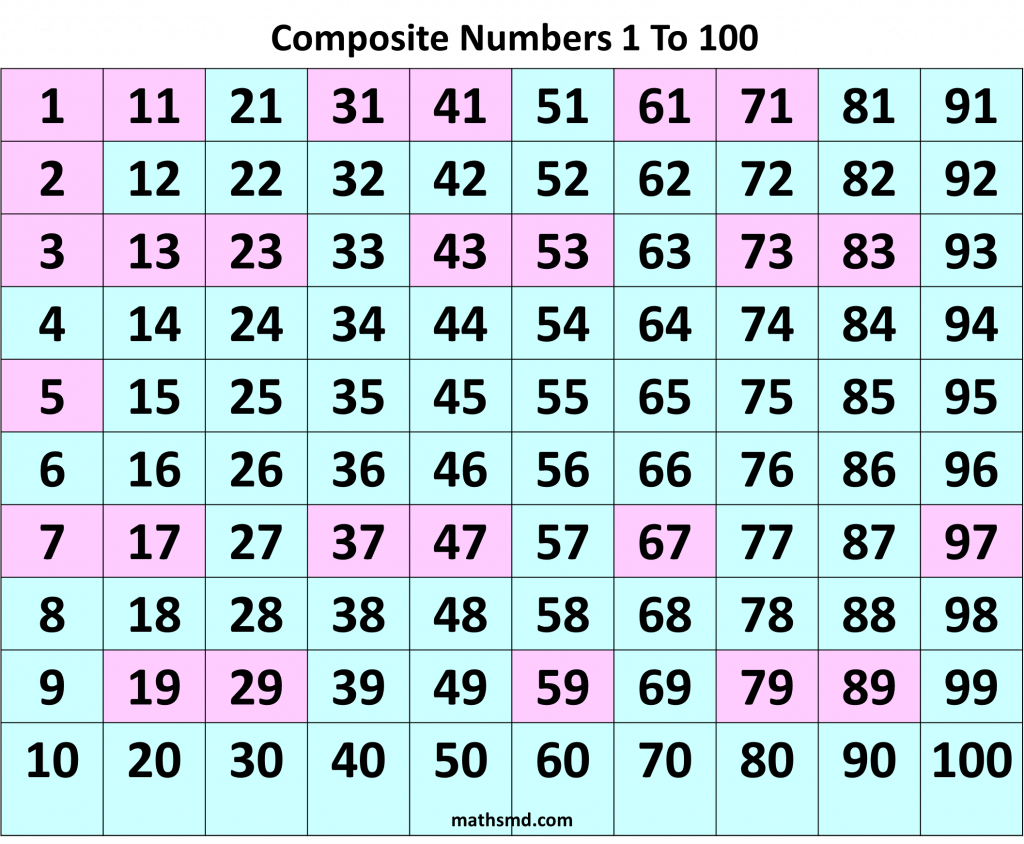Prime numbers – Composite numbers – Definition and Examples
Prime numbers – Composite numbers
What are prime numbers? What are composite numbers?
Here we will learn more about, how to classify these numbers and also answers of some common questions about prime numbers and composite numbers.
Definition: Prime numbers
A prime number is a natural number, greater than 1 with exactly two factors. A prime number is only divisible by 1 and itself.
OR
A natural number which has exactly two factors, i.e. 1 and the number itself, is a prime number.
In simple words,

If a number is only divisible by 1 and itself, then it is a prime number.
It means the number 1 can never be a prime number, so any prime number should have only two factors and should be greater than 1.

Every prime number is an odd number except the number 2.
Let us see some example of prime numbers.
Let’s take a number 11, it can be written as 1 x 11 and 11 x 1.
There is no other way of writing this number, so the factors of 11 are 1 and 11. They have only 1 as their common factor. Therefore, we can say that 11 is a prime number.
we can say that the factors of 13 are 1 x 13 and, 13 x 1 and the factors of 31 are 1, 31. They have only 1 as their common factor.
Similarly, we can say that the factors of 2, 3, 5, 7, 17…etc can be written only in two forms with a single factor as 1, hence numbers are prime numbers.
The numbers 2, 3, 5, 7, 11, 13, 17, 19, 23, 29, 31, 37, etc., are first few prime numbers.
3 is also a prime number because the factors of 3 is only 1 and 3, (1 times 3 = 3) no other natural numbers can multiply together to make 3.
4 is a not a prime number because the factors of 4 is 1, 2 and 4, (1 times 4 = 4, 2 times 2 = 4) 4 has more than 2 factors, so 4 is not a prime number.
In below table yellow box shows the prime numbers from 1 to 100.
Definition: Composite numbers
Composite numbers are whole numbers, that have more than two factors.
OR
A number which is divisible by more than two numbers is known as a composite number.
Example: 2 has only two factors 1 and 2 (1 x 2), and 4 has 3 factors, 1, 2, and 4 (1 x 4 and 2 x 2).
So, when we want to determine whether a number is prime or composite, we must figure out how many factors that number has.
In below table blue box, shows the composite numbers from 1 to 100.

Every non-prime number is a composite number.
Example- 4, 6, 8, 10, 12, 14, 16, 18 etc.
Questions with Answers
Question: Is 1 a prime number?
Answer: No, 1 is not a prime number because 1 is not divisible by two numbers or 1 has not two factors.
Question: Is 1 a composite number?
Answer: No, 1 is not a composite number because 1 is not divisible by more than two numbers or 1 has not more than two factors.
Identify the number Prime or Composite
When we want to determine whether a number is prime or composite, we must figure out how many factors that number has.
Let us consider the numbers from 1 to 10. Now we Identify which of these numbers are prime and composite numbers?
Example- Let us start with 2, from the definition of prime number,
A prime number is a natural number greater than 1, with exactly two factors. A prime number is only divisible by 1 and itself.
2 is a prime number because the factors of 2 is only 1 and 2, (1 times 2 = 2) no other natural numbers can multiply together to make 2 and 2 is divisible by only 1 and 2.
3 is also a prime number because the factors of 3 is only 1 and 3, (1 times 3 = 3) no other natural numbers can multiply together to make 3 and 3 is divisible by only 1 and 3.
4 has 3 factors, 1, 2, and 4 (1 x 4 and 2 x 2).
So, 4 is a composite number.
5 is a prime number.
6 is a composite number, it has a number of factors like 1, 2, 3, and 6.
7 is a prime number.
8 is a composite number, it has a number of factors like 1, 2, 4, and 8.
9 is a composite number, it has a number of factors like 1, , 3, and 9.
10 is a composite number, it has a number of factors like 1, 2, 10 and 5.
The best way to figure out that number is prime number or composite number is perform the divisibility test. To do this, we should check to see that if the number is divide by 2, 3, 5, 7, 11 and 13.
It the number ends with 0 or 5, try to dividing by 5. If the number can not be divided by any these six numbers, then the number is most likely a prime number.
For divisibility test we see some examples.
283
We find that 283/2 = 141.5283/3 = 94.33283/5 = 56.6283/7 = 40.43283/11 = 25.72283/13 = 21.76
We see that none of the quotients are whole numbers, therefore, we can confidently say that 283 is a prime number.
250
The number is ends with 0 or 5, try to dividing by 5.We see that number has divided by 5 and factors of 250 are 2, 5, 10, 50, 25. Since the number has more than 2 factors, so it is a composite number.
